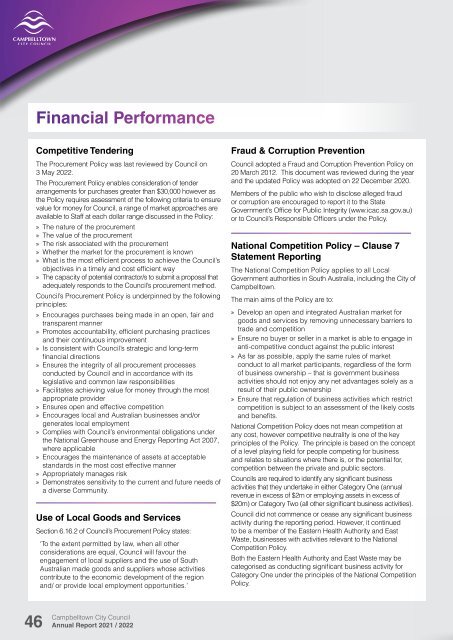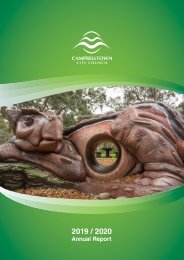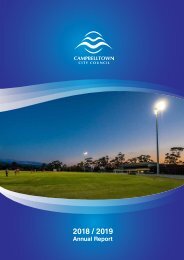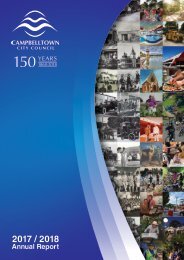2021/2022 Annual Report
You also want an ePaper? Increase the reach of your titles
YUMPU automatically turns print PDFs into web optimized ePapers that Google loves.
Financial Performance<br />
Competitive Tendering<br />
The Procurement Policy was last reviewed by Council on<br />
3 May <strong>2022</strong>.<br />
The Procurement Policy enables consideration of tender<br />
arrangements for purchases greater than $30,000 however as<br />
the Policy requires assessment of the following criteria to ensure<br />
value for money for Council, a range of market approaches are<br />
available to Staff at each dollar range discussed in the Policy:<br />
» The nature of the procurement<br />
» The value of the procurement<br />
» The risk associated with the procurement<br />
» Whether the market for the procurement is known<br />
» What is the most efficient process to achieve the Council’s<br />
objectives in a timely and cost efficient way<br />
» The capacity of potential contractor/s to submit a proposal that<br />
adequately responds to the Council’s procurement method.<br />
Council’s Procurement Policy is underpinned by the following<br />
principles:<br />
» Encourages purchases being made in an open, fair and<br />
transparent manner<br />
» Promotes accountability, efficient purchasing practices<br />
and their continuous improvement<br />
» Is consistent with Council’s strategic and long-term<br />
financial directions<br />
» Ensures the integrity of all procurement processes<br />
conducted by Council and in accordance with its<br />
legislative and common law responsibilities<br />
» Facilitates achieving value for money through the most<br />
appropriate provider<br />
» Ensures open and effective competition<br />
» Encourages local and Australian businesses and/or<br />
generates local employment<br />
» Complies with Council’s environmental obligations under<br />
the National Greenhouse and Energy <strong>Report</strong>ing Act 2007,<br />
where applicable<br />
» Encourages the maintenance of assets at acceptable<br />
standards in the most cost effective manner<br />
» Appropriately manages risk<br />
» Demonstrates sensitivity to the current and future needs of<br />
a diverse Community.<br />
Use of Local Goods and Services<br />
Section 6.16.2 of Council’s Procurement Policy states:<br />
‘To the extent permitted by law, when all other<br />
considerations are equal, Council will favour the<br />
engagement of local suppliers and the use of South<br />
Australian made goods and suppliers whose activities<br />
contribute to the economic development of the region<br />
and/ or provide local employment opportunities.’<br />
Fraud & Corruption Prevention<br />
Council adopted a Fraud and Corruption Prevention Policy on<br />
20 March 2012. This document was reviewed during the year<br />
and the updated Policy was adopted on 22 December 2020.<br />
Members of the public who wish to disclose alleged fraud<br />
or corruption are encouraged to report it to the State<br />
Government’s Office for Public Integrity (www.icac.sa.gov.au)<br />
or to Council’s Responsible Officers under the Policy.<br />
National Competition Policy – Clause 7<br />
Statement <strong>Report</strong>ing<br />
The National Competition Policy applies to all Local<br />
Government authorities in South Australia, including the City of<br />
Campbelltown.<br />
The main aims of the Policy are to:<br />
» Develop an open and integrated Australian market for<br />
goods and services by removing unnecessary barriers to<br />
trade and competition<br />
» Ensure no buyer or seller in a market is able to engage in<br />
anti-competitive conduct against the public interest<br />
» As far as possible, apply the same rules of market<br />
conduct to all market participants, regardless of the form<br />
of business ownership – that is government business<br />
activities should not enjoy any net advantages solely as a<br />
result of their public ownership<br />
» Ensure that regulation of business activities which restrict<br />
competition is subject to an assessment of the likely costs<br />
and benefits.<br />
National Competition Policy does not mean competition at<br />
any cost, however competitive neutrality is one of the key<br />
principles of the Policy. The principle is based on the concept<br />
of a level playing field for people competing for business<br />
and relates to situations where there is, or the potential for,<br />
competition between the private and public sectors.<br />
Councils are required to identify any significant business<br />
activities that they undertake in either Category One (annual<br />
revenue in excess of $2m or employing assets in excess of<br />
$20m) or Category Two (all other significant business activities).<br />
Council did not commence or cease any significant business<br />
activity during the reporting period. However, it continued<br />
to be a member of the Eastern Health Authority and East<br />
Waste, businesses with activities relevant to the National<br />
Competition Policy.<br />
Both the Eastern Health Authority and East Waste may be<br />
categorised as conducting significant business activity for<br />
Category One under the principles of the National Competition<br />
Policy.<br />
46<br />
Campbelltown City Council<br />
<strong>Annual</strong> <strong>Report</strong> <strong>2021</strong> / <strong>2022</strong>














